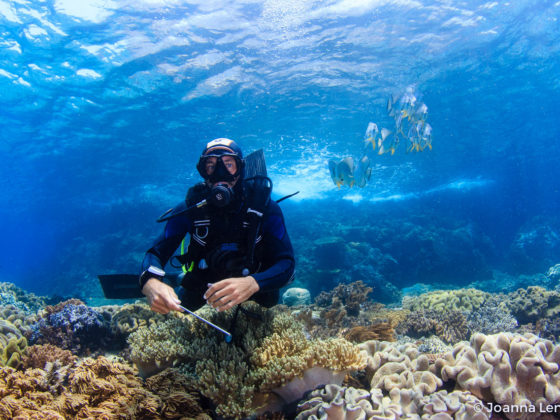PLASTIC POLLUTION, overfishing, and acidification put immense pressures on our world’s oceans. While the oceans remain our lifeline in so many ways, adverse human impact has become increasingly alarming. As leading ocean scientist Dr. Sylvia Earle put it, “We need to respect the oceans and take care of them as if our lives depended on them. Because they do.” With this spirit of informed urgency, here are twelve simple things we can all do every day to help reverse the trend against our planet’s oceans and marine life.

12 Simple Things You Can Do Every Day to Help Our Oceans
Say no to plastic straws.
According to the National Park Service, Americans use 500 million drinking straws every day. At the end of one year, we could fill 46,500 school buses with plastic straws. These straws end up in our oceans and harm marine life. Limiting our use of single-use plastics is an important step to a healthier ocean.
Avoid products with microbeads.
Did you know everything from toothpastes to face scrubs contain tiny pieces of plastic also known as microbeads? While Obama signed a bill to phase these out over 2017 it can’t hurt to stop using them now. Avoid products with ingredients such as polypropylene, polyethylene, and nylon, as these are the most common plastic microbead materials.
Stop eating shrimp.
Whether wild or farmed, shrimp are environmental nightmares. For every pound of wild caught shrimp, 10-14 pounds of by-catch (unwanted marine species) is dumped back into the sea. Trawling is the most widely used method of wild shrimp fishing and decimates everything in its path, destroying ecosystems down to the baseline. Farmed shrimp aren’t any better: Across Asia and Latin America mangroves are cleared to pave the way for shrimp farm development. According to ecologist Boone Kauffman of Oregon State University, “a 100-gram shrimp cocktail represents an astonishing 198 kilograms of carbon dioxide from the loss of the mangrove, the equivalent of burning 90 gallons of gasoline.”
Boycott restaurants serving blue fin tuna.
As with all apex predators, the blue fin tuna plays an important role in maintaining the health of our ocean’s ecosystem. With the species on the brink of extinction, it is our duty to hold restaurant owners and corporations, who contribute to the extinction of the species accountable.
Get familiar with Seafood Watch.
We have all heard how seafood will likely be off the menu by 2048 or sooner but what are we doing about it exactly? According to a recent report by the WWF, more than “85% of global fish stocks in our oceans are at significant risk of illegal, unreported and unregulated fishing.” Of this figure, approximately 30% enters the US. If you can’t live without fish, at least eat it in moderation and check out the Monterrey Bay Aquarium’s sustainable seafood guide for your region. Choose species which aren’t on the decline and opt for fish caught on rod and reel, as opposed to trawling and long-lines.
Make a change with your wallet.
Let your wallet and wardrobe help support the cause. Patagonia, Nike, and Adidas have already introduced lines made from recycled ocean plastics. Pharrell Williams has also started his own ocean plastics fashion line called RAW for the Oceans. There are dedicated apps and sites, which help consumer’s get the facts about the brands they support. Check out GoodGuide and Buycott to start.
Consider your home décor options.
It can be tempting to want to decorate your home with beautiful pieces of coral, sea fans, or sponges, but we all know these items belong in the ocean. Did you know coral is a living, breathing organism and most species only grow a centimeter a year? It’s easy to find good underwater photography, which can just as easily be displayed in your home. For example, check out my underwater seascapes at Deep Focus Images.
Pay attention to what’s in your sunscreen.
Some sunscreen brands, which claim to be reef-friendly, surprisingly contain two common ingredients: Benzophenone-3 (also known as Oxybenzone) and Oxtinoxate/Octyl methoxcinnamate. These ingredients are known to cause complete coral bleaching in very low concentrations and should be avoided. Looking for a product that cares? Check out: Stream2Sea and ReefSafe.
Skip the marine park/dolphin show.
While some aquariums follow a true conservation platform, generally the masses are doing a disservice to the oceans by supporting marine life in captivity. Can’t get to the ocean? There are some mesmerizing ocean documentaries out there by the BBC, National Geographic, and Disney, which bring the ocean to life in your living room.
Think twice about cruises.
No one can debate that cruises are a great bang for your buck. However, before you book your next cruise holiday, consider that the average 7-day cruise with 3,000 people disposes of 210,000 gallons of sewage, 130 gallons of hazardous waste, 25,000 gallons of oily bilge water, and 1 million gallons of gray water into the sea. According to NABU, “One cruise ship emits as many air pollutants as 5 million cars on the same distance!” Some of these pollutants include black carbon, which is the second leading cause of climate change.
Use eco-friendly cleaning products.
Since a lot of what goes down the drains ends up in our rivers and streams, we should be mindful of the chemicals in our cleaning products. Opt for products with eco-friendly labels or make your own.
Spread the word and inspire others.
Do you like to snorkel or scuba dive? Encouraging others to explore the ocean with you is a great way to promote a true appreciation of it. At the end of the day we only protect what we love. Becoming an ambassador for the ocean starts with you.